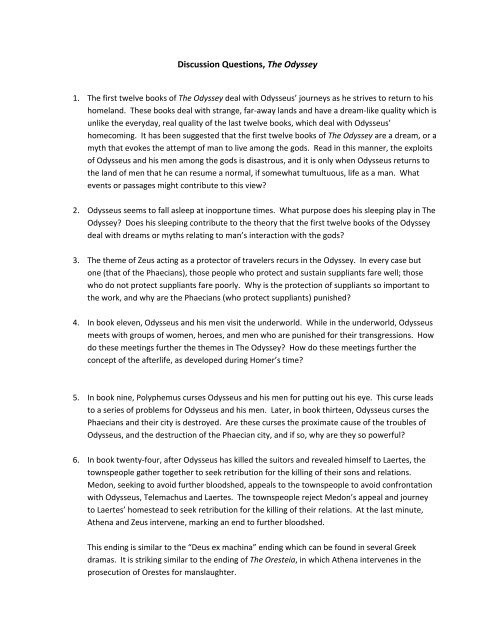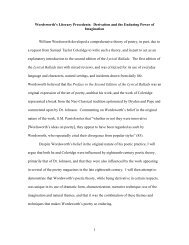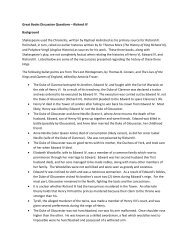Discussion Questions, The Odyssey - Peter Ponzio
Discussion Questions, The Odyssey - Peter Ponzio
Discussion Questions, The Odyssey - Peter Ponzio
You also want an ePaper? Increase the reach of your titles
YUMPU automatically turns print PDFs into web optimized ePapers that Google loves.
<strong>Discussion</strong> <strong>Questions</strong>, <strong>The</strong> <strong>Odyssey</strong><br />
1. <strong>The</strong> first twelve books of <strong>The</strong> <strong>Odyssey</strong> deal with Odysseus’ journeys as he strives to return to his<br />
homeland. <strong>The</strong>se books deal with strange, far‐away lands and have a dream‐like quality which is<br />
unlike the everyday, real quality of the last twelve books, which deal with Odysseus’<br />
homecoming. It has been suggested that the first twelve books of <strong>The</strong> <strong>Odyssey</strong> are a dream, or a<br />
myth that evokes the attempt of man to live among the gods. Read in this manner, the exploits<br />
of Odysseus and his men among the gods is disastrous, and it is only when Odysseus returns to<br />
the land of men that he can resume a normal, if somewhat tumultuous, life as a man. What<br />
events or passages might contribute to this view?<br />
2. Odysseus seems to fall asleep at inopportune times. What purpose does his sleeping play in <strong>The</strong><br />
<strong>Odyssey</strong>? Does his sleeping contribute to the theory that the first twelve books of the <strong>Odyssey</strong><br />
deal with dreams or myths relating to man’s interaction with the gods?<br />
3. <strong>The</strong> theme of Zeus acting as a protector of travelers recurs in the <strong>Odyssey</strong>. In every case but<br />
one (that of the Phaecians), those people who protect and sustain suppliants fare well; those<br />
who do not protect suppliants fare poorly. Why is the protection of suppliants so important to<br />
the work, and why are the Phaecians (who protect suppliants) punished?<br />
4. In book eleven, Odysseus and his men visit the underworld. While in the underworld, Odysseus<br />
meets with groups of women, heroes, and men who are punished for their transgressions. How<br />
do these meetings further the themes in <strong>The</strong> <strong>Odyssey</strong>? How do these meetings further the<br />
concept of the afterlife, as developed during Homer’s time?<br />
5. In book nine, Polyphemus curses Odysseus and his men for putting out his eye. This curse leads<br />
to a series of problems for Odysseus and his men. Later, in book thirteen, Odysseus curses the<br />
Phaecians and their city is destroyed. Are these curses the proximate cause of the troubles of<br />
Odysseus, and the destruction of the Phaecian city, and if so, why are they so powerful?<br />
6. In book twenty‐four, after Odysseus has killed the suitors and revealed himself to Laertes, the<br />
townspeople gather together to seek retribution for the killing of their sons and relations.<br />
Medon, seeking to avoid further bloodshed, appeals to the townspeople to avoid confrontation<br />
with Odysseus, Telemachus and Laertes. <strong>The</strong> townspeople reject Medon’s appeal and journey<br />
to Laertes’ homestead to seek retribution for the killing of their relations. At the last minute,<br />
Athena and Zeus intervene, marking an end to further bloodshed.<br />
This ending is similar to the “Deus ex machina” ending which can be found in several Greek<br />
dramas. It is striking similar to the ending of <strong>The</strong> Oresteia, in which Athena intervenes in the<br />
prosecution of Orestes for manslaughter.
Does the ending in any way diminish the story of Odysseus? Is the ending intended to<br />
demonstrate the wisdom of the gods, since left to themselves, the men of Ithaca would have<br />
engaged in continued acts of retribution? Does the ending add to the circular nature of the<br />
story, since the epic began with Zeus and Athena discussing Odysseus’ future, and homecoming<br />
in Ithaca?<br />
7. Curses are uttered three times in the <strong>Odyssey</strong>, and in all three cases, the curse comes true. <strong>The</strong><br />
first curse is uttered by Polyphemus in Book nine. <strong>The</strong> second curse is uttered by Odysseus in<br />
book thirteen. <strong>The</strong> third curse is uttered by Penelope in book seventeen. In each case, the<br />
curse is uttered by someone who suffers at the hands of another. Why are these curses<br />
effective? Does the effectiveness of the curse of Polyphemus, who himself has wronged<br />
Odysseus; make the curse seem less of a punishment for evil and more of an invocation of the<br />
power of the gods? Is there a concept of morality hidden in these curses, or is the curse<br />
designed to address a perceived wrong?<br />
8. <strong>The</strong> theme of the good host and suppliant recurs in the <strong>Odyssey</strong>. In book fifteen, Menelaus<br />
relates his understanding of the role of suppliant and host to Telemachus. Menelaus seems to<br />
imply that there is a reciprocal relationship between the suppliant and host. In fact, a case can<br />
be made that the violation of this relationship was at the heart of the Trojan War, and that the<br />
violation of this relationship forms the basis for the <strong>Odyssey</strong> as well. Is Menelaus’ conception of<br />
the duty of host/suppliant the most nearly correct view when looking at the Iliad and the<br />
<strong>Odyssey</strong> in total?<br />
9. During the course of the <strong>Odyssey</strong>, Odysseus falls asleep at inopportune times. We also see<br />
Penelope sleep at various times in the epic. In the case of Odysseus, we are not told of his<br />
dreams, but in the case of Penelope, we are informed of her dream in book nineteen. Why is<br />
the concept of sleep and dreams so important in the <strong>Odyssey</strong>? Is Penelope testing Odysseus<br />
when she relates her dreams to him? Why does Penelope say, just before relating her dream to<br />
Odysseus, in chapter nineteen, “if he (Odysseus) ever existed”?<br />
10. Throughout the last twelve books of the <strong>Odyssey</strong>, there are several portents shown, which are<br />
either sent by the gods, or requested by characters from the gods. In each case, the portent is<br />
favorable for Odysseus and Telemachus, and unfavorable for the suitors. Despite the<br />
assurances of both Athena and Zeus, Odysseus continues to request portents that point to a<br />
favorable outcome. Why does Odysseus continue to seek portents, when he is told by Athena<br />
that he will prevail? Does Odysseus’ continued request for portents indicate a lack of belief or<br />
trust in the gods?




